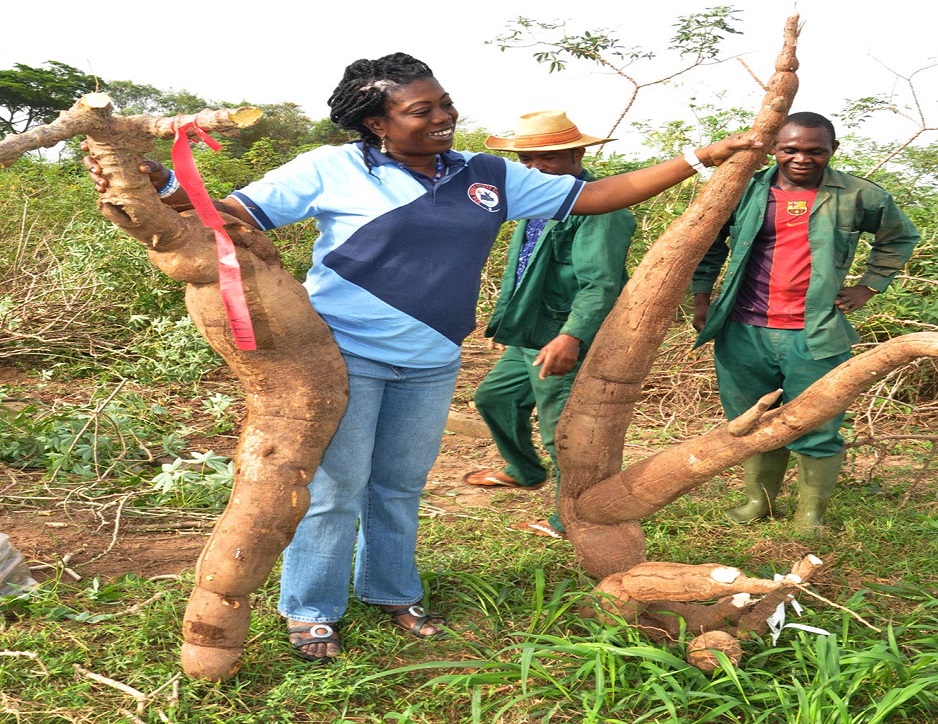Economy
IITA, MEDA to Plans Sustainable Seed System for Cassava


By Dipo Olowookere
Cassava farmers and processors in Tanzania have another reason to smile as a new project to address one of their major challenges―the lack of access to clean planting material of new improved, disease-resistant varieties―is launched.
The five-year project titled Building an Economically Sustainable Seed System for Cassava in Tanzania – BEST Cassava seeks to set up an accessible and affordable commercial seed system for quality assured planting material of improved, disease-resistant varieties. It is funded by the Bill & Melinda Gates Foundation.
It will be implemented by the Mennonite Economic Development Associates (MEDA) with the Tanzanian Ministry of Agriculture, Livestock and Fisheries (MALF), and IITA in 11 regions in Tanzania.
The project was recently launched by Engineer Mathew Mtigumwe, the Permanent Secretary (PS), Ministry of Agriculture, at a ceremony in Dar es Salaam, Tanzania. It comes hot in the heels of a recent announcement of a US$1 billion partnership between Tanzania and a Chinese firm to commercialize cassava farming and processing. The PS applauded the project as he noted its timeliness in the ongoing efforts to exploit cassava’s great potential to boost the income of farmers and fight rural poverty.
“The production of cassava in Tanzania is affected by two devastating diseases―cassava mosaic disease (CMD) and cassava brown streak disease (CBSD). Therefore, providing farmers access to high quality planting materials of high-yielding, disease-resistant, improved cassava varieties will allow them to exploit this new opportunity and others to unleash widespread economic impact on smallholder farmers and lead to positive ripple effects throughout the community,” he said in a speech read on his behalf by Hussein Mansoor, the Director of Research and Development (DRD) in the Ministry.
MEDA’s Stephen Magige, Project Manager of BEST Cassava, said that the project aims to “have a commercialized cassava seed system in place that will facilitate farmers’ access to cassava planting materials of improved varieties for increased farmers’ productivity and incomes”.
The project will support more than 430 privately owned cassava seed entrepreneur businesses that will directly target approximately 29,000 smallholder farmers and indirectly benefit over 1 million farmers and their households.
Regina Kapinga, Head of Advocacy and Resource Mobilization, who is leading the team from the IITA side, noted that increased commitment and investment by the government in the development of the cassava seed sector will lead to improved livelihoods of smallholder farmers. The other researchers from IITA are Edward Kanju, cassava breeder, and James Legg, plant virologist.
The commercialized seed system will provide farmers access to new improved varieties developed by the national breeding program in collaboration with IITA.
“The national cassava breeding program has released new varieties which have the potential to produce more than 20 t/ha without the use of fertilizers and irrigation. These varieties also have tolerance to cassava mosaic and cassava brown streak diseases. The seed systems will ensure that they reach farmers quickly and cost effectively,” said Geoffrey Mkamilo, the National Coordinator for the Root and Tuber Crops Research Program from the Ministry of Agriculture.
The project builds on the successes and lessons and the teams from three previous projects funded by the Gates Foundation launched in 2012. These are: the Cassava Varieties and Clean Seed to Combat CBSD and CMD (5CP) project led by IITA; Commercially Sustainable Quality Assured CassavaSeed System, implemented by MEDA; and the Community Action in Controlling Cassava Brown Streak Disease through the Clean Seed project led by the DRD.
Economy
NGX All-Share Index Jumps 0.17%

By Dipo Olowookere
A 0.17 per cent growth was recorded by the Nigerian Exchange (NGX) Limited on Friday, extending the stay of the local bourse in the positive territory.
This uptrend was maintained despite profit-taking in the banking sector, which left its index down by 0.23 per cent at the close of trading activities.
Business Post reports that the insurance industry expanded by 4.04 per cent during the session, the energy counter improved by 1.05 per cent, and the consumer goods space gained 0.58 per cent, while the industrial goods sector closed flat.
Consequently, the All-Share Index (ASI) went up by 170.62 points to 102,353.68 points from 102,183.06 points and the market capitalisation grew by N541 billion to N62.851 trillion from N62.310 trillion.
There were 34 price gainers and 22 price losers yesterday, indicating a positive market breadth index and strong investor sentiment.
The trio of Caverton, Livestock Feeds and Sovereign Trust Insurance appreciated by 10.00 per cent each during the session to quote at N2.20, N5.94, and N1.10, respectively, as Neimeth jumped by 994 per cent to N3.43, and Royal Exchange increased by 9.88 per cent to 89 Kobo.
On its part, Academy Press lost 9.74 per cent to close at N3.15, PZ Cussons declined by 9.09 per cent to N25.00, DAAR Communications weakened by 8.64 per cent to 74 Kobo, Transcorp Power shed 5.91 per cent to settle at N46.95, and Dangote Sugar fell by 4.94 per cent to N38.50.
A total of 327.8 million shares valued at N11.8 billion were traded in 11,905 deals on Friday versus the 472.2 million shares worth N16.7 billion transacted in 12,336 deals on Thursday, representing a decline in the trading volume, value, and number of deals by 30.58 per cent, 29.34 per cent and 3.49 per cent apiece.
Access Holdings recorded the highest sales with 49.1 million stocks sold for N1.2 billion, Fidelity Bank exchanged 20.4 million shares valued at N359.0 million, UBA traded 20.1 million equities worth N681.0 million, Oando transacted 14.8 million shares for N998.1 million, and Universal Insurance traded 13.8 million stocks worth N8.7 million.
Economy
NASD OTC Exchange Gains 0.26%

By Adedapo Adesanya
The NASD Over-the-Counter (OTC) Securities Exchange extended its upward movement with a 0.26 per cent gain on Friday, January 17 amid renewed interest in unlisted stocks.
This raised the market capitalisation of the trading platform by N2.79 billion at the close of business to N1.075 trillion from the N1.072 trillion it closed in the preceding session.
In the same vein, the NASD Unlisted Security Index (NSI) went up by 8.08 points at the close of transactions to 3,111.91 points from the 3,103.83 points recorded at the previous session.
Yesterday, the volume of securities traded by investors went down by 606 per cent to 486,215 units from 1.2 million units, the value of shares shrank by 84.7 per cent to N2.8 million from N18.0 million, and the number of deals decreased by 65 per cent to 14 deals from the 33 deals carried out a day earlier.
In the final trading day of the week, there were three price gainers and one price loser, Geo-Fluids Plc, which lost 9 Kobo to finish at N4.70 per unit versus the preceding session’s price of N4.79 per unit.
On the flip side, Okitipupa Plc gained N3.60 to settle at N39.59 per share compared with the previous day’s N35.99 per share, Industrial and General Insurance (IGI) Plc added 3 Kobo to wrap at 36 Kobo per unit compared with the preceding session’s 33 Kobo per share, as FrieslandCampina Wamco Nigeria Plc improved its value by 49 Kobo to N39.65 per unit from N39.16 per unit.
At the close of business, FrieslandCampina Wamco Nigeria Plc remained the most active stock by value (year-to-date) with 3.4 million units worth N134.9 million, trailed by Geo-Fluids Plc with 8.9 million units valued at N43.0 million, and Afriland Properties Plc with 690,825 sold for N11.1 million.
The most active stock by volume (year-to-date) remained IGI Plc with 23.5 million units worth N5.3 million, followed by Geo-Fluids Plc with 8.9 million units valued at N43.0 million, and FrieslandCampina Wamco Nigeria Plc with 3.4 million units sold for N134.9 million.
Economy
Naira Rallies by 0.06% to N,1547/$1 at NAFEM

By Adedapo Adesanya
The Naira extended its appreciation against the US Dollar by 0.06 per cent or N89 Kobo on the US Dollar at the Nigerian Autonomous Foreign Exchange Market (NAFEM) on Friday, January 17, trading at N1,547.58/$1 compared with the previous day’s value of N1,548.47/$1.
Market analysts expect that the Naira will appreciate in the first quarter of the year, backed by continued policy support by the Central Bank of Nigeria (CBN).
Vestance Nigeria, an agribusiness advisory firm, projects that the exchange rate will trade between N1,650/$1 and N1,750/$1 this year in its Resilience and Recovery for Agribusiness in 2025 outlook report.
“The Central Bank of Nigeria (CBN) will continue implementing reforms to enhance exchange rate market transparency while maintaining higher interest rates to curb inflationary pressures and attract foreign portfolio management,” it said.
Also, the Nigerian currency improved its value against the Pound Sterling by N20.84 to wrap the session at N1,883.59/£1 versus the preceding day’s N1,904.43/£1 and against the Euro, the Nigerian currency gained N10.45 to settle at N1,590.34/€1, in contrast to Thursday’s closing price of N1,600.79/€1.
In the parallel market, the domestic currency appreciated against the greenback by N5 yesterday to sell for N1,675/$1 compared with the N1,675/$1 it was traded a day earlier.
As for the cryptocurrency market, there was profit-taking amid excitement for a new era of crypto-friendly US government mounts ahead of Donald Trump’s inauguration next week.
Crypto investors expect a change from Mr Trump who promised on the campaign trail to position the US as a leader in the crypto space including creating a national stockpile of Bitcoin, in stark contrast to past years’ regulatory crackdowns and enforcements.
Litecoin (LTC) fell by 9.9 per cent to trade at $124.56, Ripple (XRP) slumped by 6.2 per cent to $3.10, Cardano (ADA) dipped by 4.9 per cent to $1.06, Ethereum (ETH) dropped 3.1 per cent to finish at $3,270.61, Binance Coin (BNB) went down by 2.3 per cent to $698.57 and Dogecoin (DOGE) depreciated by 2.2 per cent to $0.3927.
However, Solana (SOL) rose by 8.8 per cent to end at $235.12, Bitcoin (BTC) expanded by 0.8 per cent to $102,494.03, while the US Dollar Tether (USDT) and the US Dollar Coin (USDC) sold flat at $1.00 each.
-

 Feature/OPED5 years ago
Feature/OPED5 years agoDavos was Different this year
-
Travel/Tourism8 years ago
Lagos Seals Western Lodge Hotel In Ikorodu
-

 Showbiz2 years ago
Showbiz2 years agoEstranged Lover Releases Videos of Empress Njamah Bathing
-

 Banking7 years ago
Banking7 years agoSort Codes of GTBank Branches in Nigeria
-

 Economy2 years ago
Economy2 years agoSubsidy Removal: CNG at N130 Per Litre Cheaper Than Petrol—IPMAN
-

 Banking2 years ago
Banking2 years agoFirst Bank Announces Planned Downtime
-

 Sports2 years ago
Sports2 years agoHighest Paid Nigerian Footballer – How Much Do Nigerian Footballers Earn
-

 Technology4 years ago
Technology4 years agoHow To Link Your MTN, Airtel, Glo, 9mobile Lines to NIN












